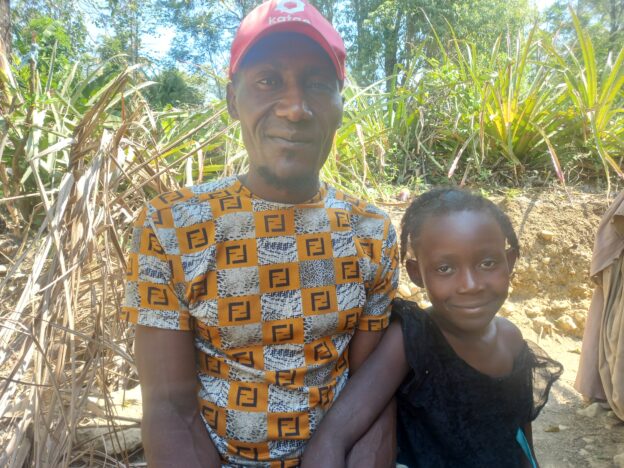Edner Louis is a single father. He lives with his four children in a beat-up shack in Pouli. It is a single room, about ten feet by five or six, with walls of rotting palm wood planks and, in places where the palm wood has rotted away entirely, sheets of tach, the large, fibrous seedpods of palm trees which serve as a poor-quality but flexible building material for the poorest of Haiti’s rural poor.
They have only been living there a couple of months. Remarkably, their previous home was, in some ways, worse. Edner and his family joined the CLM program in 2022. He and his partner Merline were living with four children in an ajoupa in Pouli, an agricultural area just southeast of downtown Laskawobas.
Ajoupa are tent-like structures, shaped like prisms, with a central beam usually held up by posts that angle up to them, forming a triangle with the ground. In the Central Plateau, they are generally covered with tach. They tend towards the ramshackle, but that wouldn’t generally matter very much because they are usually just temporary dwellings. A farmer will throw one up in a field they are working in if the field is inconveniently far from home. It gives them a place to stay when there are large tasks to accomplish in the field.
But especially poor families can find themselves making an ajoupa a permanent home, and that is what happened to Edner and Merline. They had no place of their own, but Edner worked as a field hand for a wealthier neighbor. He watched some of the man’s animals, and he did chores in the man’s fields. The neighbor allowed the family to live in his garden shed. “It wasn’t a good house, but it was what we had,” Edner explains.
Edner tried to start small businesses several times while he lived in the ajoupa. He would sell kerosene or rum and cigarettes or gasoline. But Merline couldn’t stay at home all the time, and neither could he. If the kids wandered off while their parents were out and about, his merchandise would disappear. Their ajoupa had no secure door and no place to hide anything.
And that wasn’t all they would lose.
The tach covering their home couldn’t stand up to serious rain. The whole family would be drenched by each downpour, as would all that they had. The couple owned a bed, but rains gradually rotted out the wood. They had important papers, like birth certificates, but no place dry to store them. Edner lost his certificate to rain, but he also lost the one for one of his kids. The other were reduced to barely-legible pieces.
One day, for reasons he still cannot explain, he saw that his home’s owner was starting to hire other men to do the work Edner would normally do. The man never said anything to Edner, but Edner knew that he needed to look for another place to live.
Edner talked with a friend he often worked fields with, and the friend was willing to have Edner and his family move into the shack that sits on his land. At the time, the CLM team was in the process of distributing the materials that members would need to install a latrine, which included four sheets of roofing tin. Edner borrowed the roofing intended for his latrine to cover his new house. Now at least some of it is rain-proof.
This is where Edner’s story gets complicated. Around this time, Merline started working as a maid. It gave her a small, steady income, and soon she had left her family and moved in with another man. Shortly after that, she disappeared. We do not know why. Rumors say that she moved to the Dominican Republic, but Edner and the children have had no word of her. Without steady work from his landlord he can count on, Edner has been hustling, getting day-labor in local fields to keep the children fed and in school. He and the kids take good care of their goats, but they still have just the two that the program gave them.
He would like to open a small commerce. He has experience. And normally he would be able to take a small loan from the couple’s savings and loan association to get started. But Merline took out a loan before she left him, and she moved away without paying it back. Unless he can pay it back, he won’t be able to get a loan himself. So for the time being, he is reduced to farm labor. Fortunately, there is a lot of work available this time of year.
And he has begun to talk with his friend about the land the shack is on. The man is willing to lease it for three years initially. That’s enough time to make it worth Ender’s while to build his CLM-supported house in the space. They have agreed to postpone talk of Edner’s eventually buying the parcel, but the friend has said he might eventually be open to that, too.
